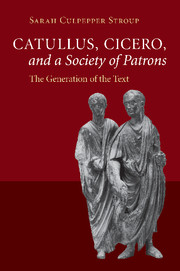Book contents
- Frontmatter
- Contents
- Preface and acknowledgments
- List of abbreviations
- Introduction
- I HOW TO WRITE ABOUT WRITING
- 1 When? Otium as “time to write”
- 2 What? Munus as the “gift of duty”
- 3 Where? Libellus: polished and published
- II THE TEXTUALIZATION OF DISPLAY
- III THE MATERIALIZATION OF THE TEXT
- Epilogue
- Appendix: What “Society of Patrons”? A prosopography of the players
- Bibliography
- Index locorum
- Index rerum et nominum
3 - Where? Libellus: polished and published
Published online by Cambridge University Press: 04 August 2010
- Frontmatter
- Contents
- Preface and acknowledgments
- List of abbreviations
- Introduction
- I HOW TO WRITE ABOUT WRITING
- 1 When? Otium as “time to write”
- 2 What? Munus as the “gift of duty”
- 3 Where? Libellus: polished and published
- II THE TEXTUALIZATION OF DISPLAY
- III THE MATERIALIZATION OF THE TEXT
- Epilogue
- Appendix: What “Society of Patrons”? A prosopography of the players
- Bibliography
- Index locorum
- Index rerum et nominum
Summary
For modern scholars, Catullus has done for libellus what Jawaharlal Nehru has done for the jacket, what Coco Chanel has done for the Little Black Dress, and what Flava Flav has done for wearing a full-sized wall clock around one's neck. He has transformed fashion into a social signifier and, in so doing, has made it eternally his own. But as much as the poet has come to be identified with the term – and seems credited, though wrongly, with its earliest usage – he uses it only four times in the whole of his corpus: twice in the dedication to Nepos (c. 1.1; 1.8), once in the context of an unwanted gift of a book (c. 14.12), and once – probably – to indicate an area of bookshops or booksellers' stalls (c. 55.4). Even in the dedication to Nepos, it is unclear exactly what the libellus included. Contemporary evidence (cf. too Cinna's libellus, noted below) suggests that libellus could have designated a single long poem (introduced by a dedicatory poem), or a collection of many poems, or anything in between. A passage of Tacitus' Dialogus links the distribution of libelli with private recitations of poetry; as such, it may have been something of an “audience handout” that served also as first-run copies of an author's latest works (Sest. 51.110, cited below, see note 12, may support this reading).
- Type
- Chapter
- Information
- Catullus, Cicero, and a Society of PatronsThe Generation of the Text, pp. 101 - 110Publisher: Cambridge University PressPrint publication year: 2010

